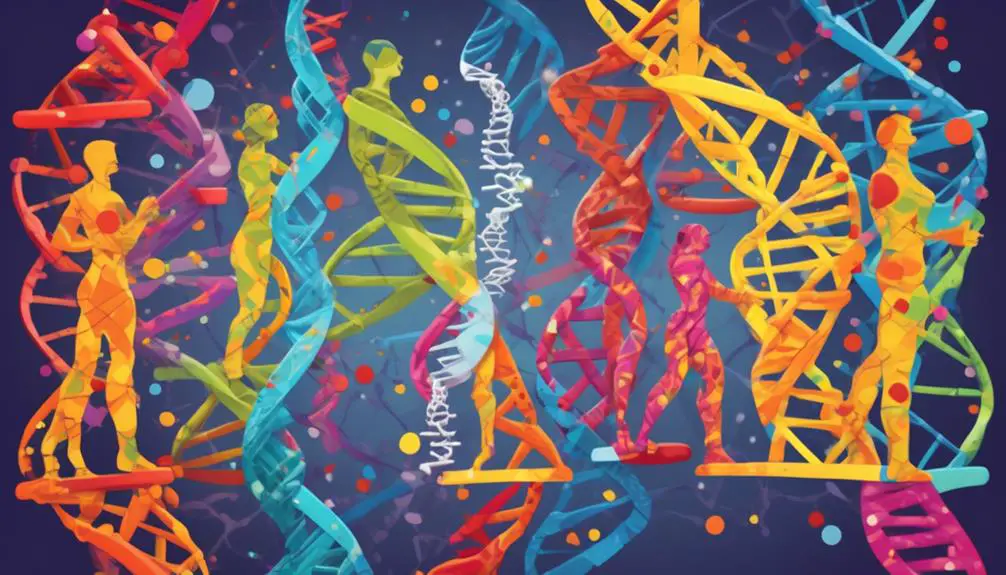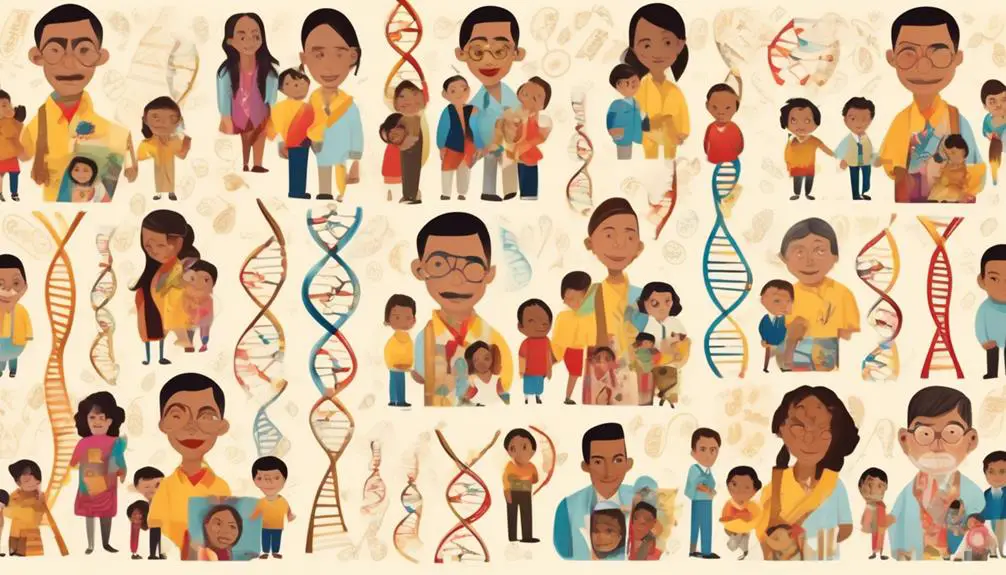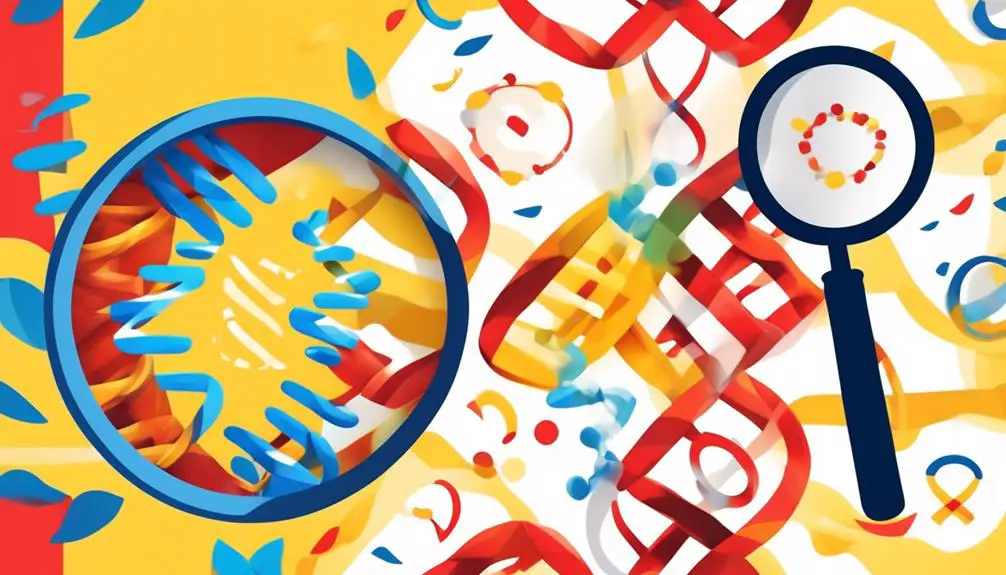As a genealogist specializing in Colombian ancestry, my experience has shown that DNA testing is a powerful tool for unraveling family history. I believe that among the myriad of options, AncestryDNA offers a rich database that has helped many Colombians, including myself, to connect with our roots.
My personal journey with this test not only revealed my diverse ethnic mosaic but also brought me face-to-face with distant relatives. It was a revelation that added layers to my family story, giving me a deeper understanding of my heritage and the health aspects that accompany it.
In this quest, privacy was a concern, but the insights gained were invaluable.
Key Takeaways
- AncestryDNA provides accurate genetic origins for Colombians using a large database of reference samples.
- Colombians have a rich tapestry of South American roots, with 81% Amerindian DNA, and significant European and African influences at 16% and 3% respectively.
- The genetic health insights from DNA testing can offer personalized information about health conditions and predispositions based on Colombian heritage.
- DNA testing allows Colombians to connect with unknown relatives and enhance their understanding of their genetic lineage, particularly in terms of paternal ancestry.
Comprehensive Ancestry Breakdown

Delving into your Colombian heritage, AncestryDNA's comprehensive ancestry breakdown utilizes 3,127 reference samples to provide you with the most accurate depiction of your genetic origins. These DNA tests unlock the secrets of your family history through detailed analysis of genetic markers.
They reveal a rich tapestry of South American roots, with the majority of Colombians showing 81% Amerindian DNA. Your ancestry breakdown may also reflect the significant European and African influences, at 16% and 3% respectively, echoing Colombia's storied past.
Understanding these genetic contributions helps you connect deeply with your ancestors. Moreover, the presence of common Y-DNA haplogroups like R1b and Q, and mtDNA haplogroup A highlights Colombia's high genetic diversity in your lineage.
Genetic Health Insights
Beyond your ancestral roots, Genetic Health Insights' DNA testing can reveal vital information about your predisposition to certain health conditions, offering personalized insights into how your Colombian heritage may impact your wellbeing.
By analyzing your DNA profile, the testing company can provide you with a detailed report on genetic traits, health risks, and carrier status.
With just a simple cheek swab, you'll unlock a wealth of genetic health insights that could guide you in proactive healthcare decisions.
This advanced technology taps into a large database tailored to Colombian populations, ensuring that your DNA test results are both accurate and relevant to your specific genetic makeup.
Embrace the opportunity to understand your body better and potentially safeguard your health with these critical insights.
Connecting With Relatives

While understanding your genetic health risks is essential, DNA testing also offers the exciting possibility of connecting with relatives you may never have known existed. With AncestryDNA's extensive database, including numerous reference samples from Colombia, you're well-equipped to explore your family tree and uncover links to others who share parts of your genetic tapestry.
By delving into the rich mosaic of Amerindian, European, and African ancestry typical in Colombians, you can find and connect with relatives from a variety of backgrounds. Understanding common Y and mtDNA haplogroups in Colombia enhances your chances of identifying relatives sharing your paternal lineage.
I recommend purchasing a DNA test and utilizing Colombian genealogy resources to deepen those connections, embracing the shared traditions and heritage that make your familial discoveries even more meaningful.
Ease of Use and Support
AncestryDNA's testing kit is designed for straightforward sample collection right from the comfort of your home, ensuring you can start your journey into genealogy with ease.
When you're exploring your gene pool, it's crucial that getting your DNA results back is as stress-free as possible. Luckily, AncestryDNA excels in ease of use and support. The companies offer comprehensive customer care, guiding you through each step. You won't feel overwhelmed with the process; instructions are clear and the website is a breeze to navigate.
If questions arise, personalized support, including genetic counselors, is at your disposal. This means you're never alone as you uncover your Colombian roots.
AncestryDNA ensures a seamless experience, from swabbing your cheek to exploring your ancestry.
Privacy and Data Security

When selecting a DNA testing service, it's essential to ensure that they've robust privacy and data security measures in place to protect your sensitive genetic information. You'll want a company that not only reveals your family histories and results but also guards them fiercely.
A good place to start is by verifying that they offer control over how your data is shared and used. Make sure they're clear about their data encryption, storage policies, and that they comply with privacy regulations. Opt for a service that lets you access, manage, and even delete your genetic data if you choose.
Frequently Asked Questions
Which DNA Test Is Best for Latinos?
You're facing Latino ancestry challenges, so select a DNA test that delves into cultural diversity, indigenous populations, migration patterns, and the Spanish influence to thoroughly examine your rich, complex heritage.
What Are the DNA Results for Colombia?
Your DNA results for Colombia will likely reflect a tapestry of indigenous roots, European influence, African heritage, and complex migration patterns, revealing the rich, blended ancestry that defines Colombian heritage.
What Is the Genetic Makeup of Colombians?
Your Colombian ancestry is a tapestry of indigenous roots, Spanish influence, and African heritage, reflecting the country's regional variability in its rich genetic makeup.
Which DNA Test Is the Most Accurate for Ethnicity?
You'll want a DNA test with high ethnicity precision, ancestry confidence, regional specificity, and test reliability. Look for one with a large sample size to ensure the most accurate ethnicity results.
Conclusion
In conclusion, you'll find AncestryDNA to be your top pick for uncovering your Colombian roots.
It's precise, backed by a vast reference database, and won't only map out your ancestry but also offer genetic health insights.
Connecting with relatives is a breeze, and you won't have to fuss over complicated procedures.
Plus, rest easy knowing your genetic data's secure.
Embrace the journey to discover the rich tapestry of your heritage with confidence and ease.

Throughout his career, Andras Kovacs has developed a deep understanding of DNA and its applications in genealogy and genetic testing. He has helped thousands of individuals uncover their ancestral heritage, using cutting-edge DNA analysis to trace family lineages and reveal connections across generations.

